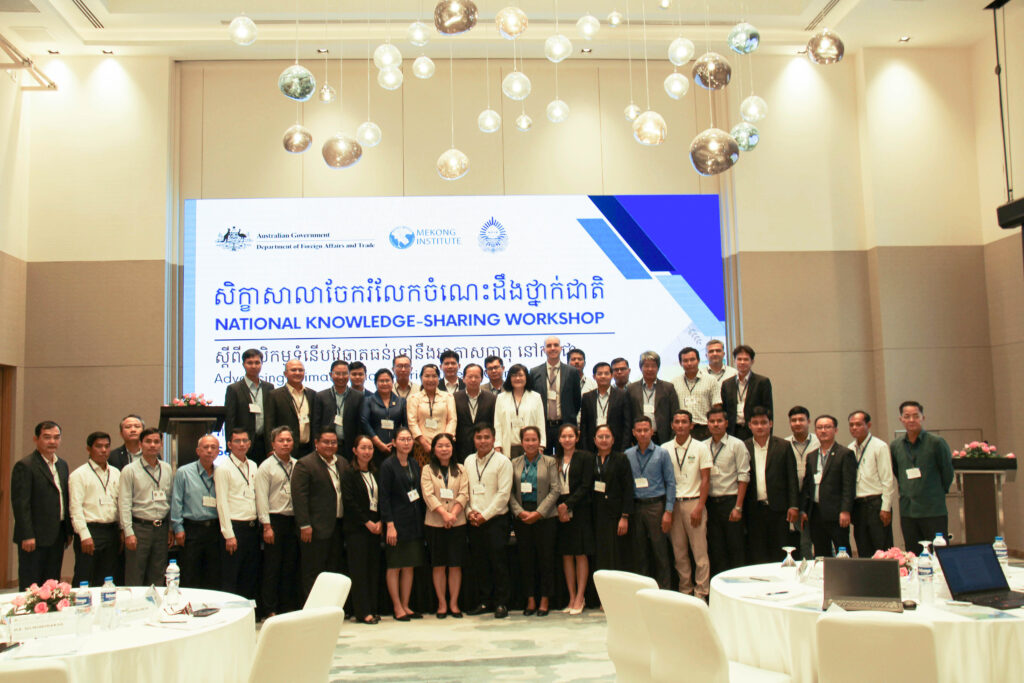Cambodia reaffirmed its commitment to advancing Climate-Smart Agriculture (CSA) during the National Knowledge-Sharing Workshop, held in Phnom Penh from September 19 to 20, 2024. Organized by the Mekong Institute (MI) in collaboration with the Australian Government Department of Foreign Affairs and Trade (DFAT) and the National School of Local Administration (NASLA) of Cambodia, the event brought together 46 stakeholders from government and development agencies, the private sector, research institutes, and universities.
In her welcome remarks, Ms. Maria Theresa S. Medialdia, Director of the Agricultural Development and Commercialization Department of MI, emphasized the workshop’s crucial role in identifying key CSA priorities for future action and collaboration between Cambodia and its development partners. She recognized the proactive steps taken by Mekong countries to incorporate CSA into their local contexts and reiterated MI’s commitment to supporting the subregion in its pursuit of climate-smart solutions to enhance the agrifood value chain.
H.E. So Munyraksa, President of NASLA, opened the workshop by highlighting the urgency of addressing the growing impacts of climate change on Cambodia’s agriculture. “Climate-Smart Agriculture offers a promising path forward,” he said, emphasizing the role CSA can play in boosting productivity, enhancing resilience, and reducing greenhouse gas emissions. He also shared success stories from CSA pilot projects in provinces such as Battambang and Kampong Thom, where farmers have successfully implemented innovative water management techniques and climate-resilient crop varieties.
A message of support was delivered by Mr. John Francis, Counsellor (Development) at the Australian Embassy in Bangkok, highlighting the importance of collaborative action in addressing the pressing challenges posed by climate change on agriculture. He expressed appreciation for the achievements made under the “Promoting Climate-Smart Agriculture Technologies and Innovations in Lower Mekong Countries” project, which has received support from Australia and encouraged stakeholders to build on this momentum to ensure the long-term resilience of the subregion’s agricultural sector.
During the keynote address, H.E. Sum Thy, Director General of the General Directorate of Policy and Strategy of the Ministry of Environment, represented by Ms. Khlok Vichethratha, Deputy Director of the Department of Climate Change, highlighted the critical role of agriculture in addressing climate change and stressed the need for integrating CSA practices into national development plans and shared key milestones, such as Cambodia’s adoption of the Cambodia Climate Change Strategic Plan and the Pentagonal Strategy, both aiming to transform the country into a low-carbon, climate-resilient economy by 2050.
The workshop focused on three key thematic areas: the enabling environment for CSA, knowledge solutions, and financing and investment mobilization. Panel discussions highlighted the challenges and opportunities within each area, offering insights from H.E. Dr. Chan Phaloeun, Under Secretary of State and Chair of Technical Working Group of Climate Change Policies at the Ministry of Agriculture, Forestry and Fisheries; H.E. Dr. Kao Thach, Delegate of the Royal Government in charge as the CEO of Agricultural and Rural Development Bank; Dr. Chea Leangsrun, Agricultural Technician Manager of the Center of Excellence on Sustainable Agricultural Intensification and Nutrition at the Royal University of Agriculture (RUA); Dr. Chhor Marith, Director of Business Development at BRM Company Co., Ltd.; and Mr. Davronjon Okhunjonov, Technical Advisor (Value Chain Development) at FAO Cambodia. The panel was moderated by Mr. Pinreak Suos, Program & Environment Specialist at the International Fund for Agricultural Development in Cambodia.
H.E. Dr. Keang Seng, Undersecretary of State at the Ministry of Interior, delivered the closing remarks, commending the active engagement and collaboration among the participants. He acknowledged the vital role of CSA in ensuring a sustainable agricultural future for Cambodia while highlighting ongoing challenges, particularly in funding, infrastructure, and technical capacity. “Despite our strong political commitment, we have yet to fully realize the potential of CSA,” he said, calling for continued collaboration and policy alignment to drive further progress.
As part of the event, participants visited CSA implementation sites, including the Toek Hout Mean Chey Kdey Sangkhem Agricultural Cooperative and the Agricultural Technology Park at the RUA. These field visits provided practical insights into how CSA practices are applied at the grassroots level.
The workshop concluded with a renewed commitment to scaling up CSA practices and technologies in Cambodia. The strategy moving forward will focus on aligning policies and improving cross-sector coordination, strengthening capacity building, digitizing knowledge-sharing platforms, simplifying access to finance, and encouraging private-sector engagement through incentives and public-private partnerships (PPPs).








